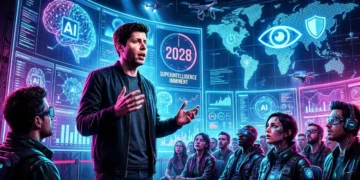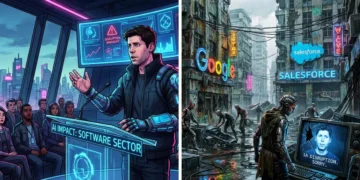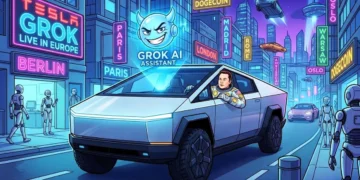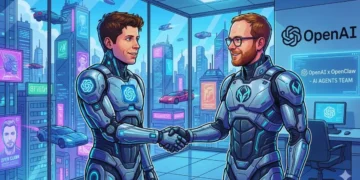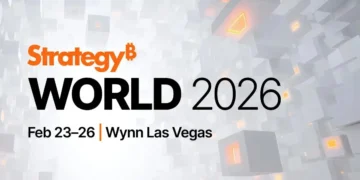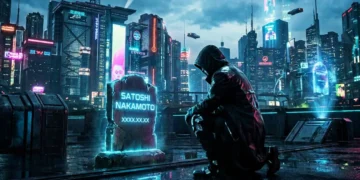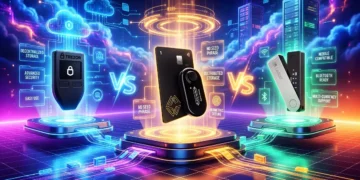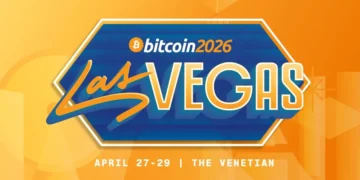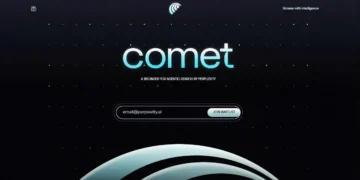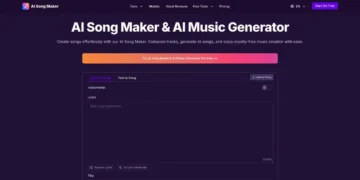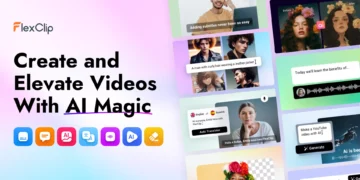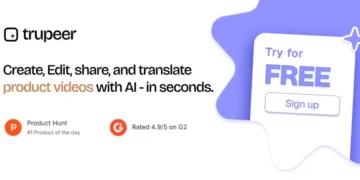Artificial intelligence (AI) is transforming our world, from healthcare and entertainment to finance and national security. Have you ever wondered who controls AI? Are tech giants, governments, or even the AI itself in control?
As AI becomes more advanced, questions about its governance, ethics, and influence are growing louder. Who created AI? How does it work behind the scenes? Most importantly, is AI dangerous?
In this deep dive, we’ll uncover the truth about who controls AI, explore insights from the BBC News series AI Decoded, and examine the role of companies like Ctrl AI in shaping this technology.
Who Created AI? A Brief History
The origins of AI can be traced back to the 1950s when pioneers like Alan Turing and John McCarthy laid the groundwork. McCarthy coined the term “artificial intelligence” in 1956, envisioning machines that could mimic human reasoning.
But how does AI work? At its core, AI relies on machine learning algorithms that analyze vast datasets, recognize patterns, and make decisions—sometimes better than humans can. From ChatGPT to self-driving cars, AI’s capabilities are expanding rapidly.
Did you know? The first AI program, “Logic Theorist,” was developed in 1956 to solve mathematical problems. Today, AI powers everything from your smartphone to global financial markets.
Who Controls AI? The Power Players
Tech Giants: The New AI Overlords?
Companies like Google, Microsoft, and OpenAI dominate AI development. Microsoft’s investment in OpenAI, the creator of ChatGPT, highlights big tech’s influence.
But who controls OpenAI? Although OpenAI began as a nonprofit, its partnership with Microsoft raises questions about corporate influence over the future of AI.
Governments & Military: AI in the Shadows
Does the CIA use AI? Absolutely. Governments worldwide deploy AI for surveillance, cybersecurity, and even autonomous weapons. The U.S. and China are at the forefront of AI military applications, sparking ethical debates.
Who governs AI? Currently, no single entity does. However, organizations like the OECD and UNESCO are pushing for global AI regulations.
Ctrl AI: A New Player in Ethical AI?
While tech giants like Google dominate the field, startups like Ctrl AI focus on responsible AI governance. Their platform helps enterprises manage AI risks, ensuring transparency and accountability.
Research Institutions
Organizations such as OpenAI, DeepMind, and academic labs play a crucial role in shaping AI development.
A recent BBC documentary titled BBC News AI Decoded highlights how these stakeholders influence the global direction of AI. The invisible hands behind AI are diverse and powerful, influencing everything from ethical considerations to geopolitical implications.
Is AI Dangerous? The Risks & Ethical Dilemmas
AI Hallucinations & Bias
AI isn’t perfect. It can “hallucinate,” generating false information, or it can inherit biases from flawed training data. For example, facial recognition AI has shown racial bias by misidentifying people of color.
Job Displacement & Economic Impact
Will AI take your job? A 2025 Forbes survey found that 35% of Americans fear AI-driven job losses, especially in customer service and manufacturing.
The Existential Threat: Superintelligent AI
Elon Musk and Bill Gates have warned that AI could surpass human control. What did Bill Gates say about AI? He called it both “promising and perilous,” urging careful regulation.
Organizations like the Partnership on AI and initiatives led by the IEEE are striving to create frameworks for responsible AI development. However, the question remains: Who will govern AI at the global level?
Currently, there is no single governing body. Instead, a patchwork of regulations and guidelines exists across different regions. For example, the EU’s proposed AI Act aims to regulate high-risk AI applications, while the U.S. focuses on voluntary corporate accountability.
Who Controls AI Information and Data?
Data ownership is one of the most debated topics in AI ethics. Who owns AI-generated data? In most cases, organizations that train AI models retain control over the data they use and generate. This raises concerns about privacy, consent, and transparency.
Moreover, where does AI get its information? Most large language models are trained using publicly available text from books, websites, and other sources. However, issues arise when this data contains copyrighted material or sensitive personal information.
To address these concerns, companies like IBM and Google are investing in data anonymization techniques and synthetic data generation to reduce their reliance on real-world data.
The Human Element: Are Humans Behind AI?
Despite AI’s sophistication, human oversight is still essential. People play a critical role in ensuring that AI behaves ethically and responsibly, from training datasets to model fine-tuning.
How does AI work behind the scenes?
At its core, what is AI? Simply put, AI refers to machines or software capable of performing tasks that typically require human intelligence, such as learning, reasoning, problem solving, perception, and language understanding.
How does AI work? Most modern AI systems rely on machine learning models that are trained using massive amounts of data. These models learn patterns and make decisions based on input data. For instance, chatbots like ChatGPT use transformer-based architectures to generate human-like responses.
Behind every AI system is a team of engineers, data scientists, and ethicists working to ensure accuracy, fairness, and safety. But here’s a thought: Are there humans behind AI? Absolutely, and they play a vital role in training, monitoring, and refining these systems.
AI operates through:
Data Ingestion (millions of books, articles, and videos).
Machine Learning (algorithms that improve with experience).
Neural Networks (mimicking the human brain).
Example: When you ask ChatGPT a question, it scans its training data (like BBC AI reports) to generate an answer.
AI in Media: From Hollywood to Real Life
What is the story behind the movie AI?
Steven Spielberg’s A.I. Artificial Intelligence (2001) explored emotional machines—a theme now becoming reality with humanoid robots like Tesla’s Optimus.
What is the best AI for filmmaking?
Tools like Runway ML and DeepDream help filmmakers create stunning visuals using AI-generated effects.
Who Controls OpenAI and Other Major Players?
Let’s take a closer look at one of the most talked-about entities in the AI space: OpenAI. Originally founded as a nonprofit, OpenAI transitioned to a for-profit model in 2019. Although it has a board of directors, Microsoft exerts significant influence through its multibillion-dollar investment.
Similarly, who controls ChatGPT? Technically, OpenAI does — but Microsoft’s partnership gives them co-control over certain aspects of the technology.
Other notable players include:
- Google DeepMind
- Anthropic (Claude AI)
- Meta (Llama series)
- IBM Watson
Each of these companies operates under different governance models, but all face scrutiny regarding transparency and accountability.
Ethics and Responsibility: Who Is Responsible for AI Mistakes?
As AI systems become more autonomous, the issue of accountability becomes more complex. Who is responsible for AI mistakes? Is it the developer, the company deploying the AI, or the algorithm itself?
Legal frameworks are still catching up. Some jurisdictions are exploring liability laws that would hold developers or deployers accountable for harmful outcomes caused by AI systems.
In the meantime, organizations like the Algorithmic Justice League are advocating for bias audits and inclusive design practices to prevent harm before it occurs.
Case study: The Story Behind the Movie AI
When it comes to storytelling, let’s take a look at a cultural touchstone: the film A.I.: Artificial Intelligence, directed by Steven Spielberg and based on an idea by Stanley Kubrick. The film explores themes of love, loss, and what it means to be human—questions that remain relevant in today’s AI debates.
But what is the best AI for filmmaking? Tools like Runway ML, Pictory, and Synthesia are transforming video editing, scriptwriting, and CGI creation. These platforms allow filmmakers to experiment with AI-generated visuals and dialogue, pushing creative boundaries.
FAQs
Who is responsible for AI mistakes?
Currently, developers and deploying companies bear legal responsibility—but laws are catching up.
Who owns AI-generated data?
A legal gray area. Courts are debating whether AI outputs belong to users, developers, or the AI itself.
Are there humans behind AI?
Yes! AI is built by engineers, but once trained, it can operate independently.
Who controls AI information?
AI information is primarily controlled by the organizations that develop and deploy the models. However, regulatory bodies and ethical committees are beginning to play a role in oversight.
Who controls character AI?
Character AI is usually governed by the platform or company that created it. For example, Character.ai has its own moderation policies, while open-source models may be community-managed.
Who is the person behind AI?
There is no single “person behind AI.” It was developed collectively by researchers, engineers, and institutions over decades. Notable contributors include Alan Turing, John McCarthy, and Geoffrey Hinton.
What did Bill Gates say about AI?
Bill Gates has praised AI for its potential to revolutionize education, healthcare, and productivity. He also warns about the need for regulation and ethical considerations.
Does the CIA use AI?
Yes, the CIA uses AI for various applications, including surveillance, data analysis, and threat detection. Government agencies worldwide are adopting AI for intelligence purposes.
Who controls OpenAI?
OpenAI is governed by a board of directors, although Microsoft has significant influence due to its financial backing and technical collaboration.
Who is responsible for AI mistakes?
Responsibility typically falls on the developers or deploying organizations, though legal frameworks are still evolving to clarify liability.
Who controls ChatGPT?
ChatGPT is controlled by OpenAI, which retains editorial and operational authority over the model.
Who governs AI?
AI governance is decentralized, involving governments, international organizations, and private companies. Initiatives like the EU AI Act aim to establish clearer rules.
Who owns AI-generated data?
Ownership usually belongs to the entity that trained the model, unless specific agreements or laws dictate otherwise.
Who is responsible for responsible AI?
Developers, deployers, and regulators share responsibility. Organizations like the Partnership on AI promote best practices for ethical AI development.
Where does AI get its information?
Most AI models are trained on publicly available data, including books, articles, websites, and code repositories.
How does AI work behind the scenes?
AI works by analyzing vast amounts of data, identifying patterns, and making predictions or decisions based on that analysis. Machine learning and neural networks are central to this process.
Are there humans behind AI?
Yes, humans are involved in every stage — from data curation to model training and evaluation. Human oversight is crucial for ensuring ethical behavior.
What is the story behind the movie AI?
A.I. Artificial Intelligence tells the story of a robotic boy designed to love unconditionally, exploring emotional depth and humanity’s relationship with technology.
What is the best AI for filmmaking?
Tools like Runway ML, Synthesia, and Pictory offer powerful features for editing, animation, and AI-generated content creation in filmmaking.
Conclusion
AI is a double-edged sword—offering incredible benefits but posing serious risks. The key question remains: Who should control AI?
Should governments regulate it strictly?
Can companies like Ctrl AI ensure ethical use?
Will AI eventually control itself?
One thing is clear: transparency, accountability, and public awareness are crucial.
What do YOU think? Should AI be controlled by corporations, governments, or an independent body? Share your thoughts below!

